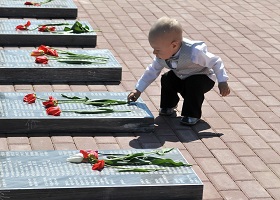Following the statements of Polish Foreign Minister Grzegorz Schetyna on the RMF FM radio station, Russian Deputy Foreign Minister Grigory Karasin said it was "a disgrace to Poland's diplomatic service" for the Polish Foreign Minister to insist on his interpretation of Russia's role in World War II and insinuate about the format for celebrating the 70th anniversary of the Victory Day by disputing the grounds for Moscow to serve as center for the festivities.
Following the statements of Polish Foreign Minister Grzegorz Schetyna on the RMF FM radio station, Russian Deputy Foreign Minister Grigory Karasin said it was "a disgrace to Poland's diplomatic service" for the Polish Foreign Minister to insist on his interpretation of Russia's role in World War II and insinuate about the format for celebrating the 70th anniversary of the Victory Day by disputing the grounds for Moscow to serve as center for the festivities.
To be more precise, Mr. Schetyna was commenting on the proposal that Polish President Bronislaw Komorowski made in an interview on January 26 to Gazeta Wyborcza to hold the celebration on May 8 on Westerplatte Peninsula near Gdansk with the participation of EU countries. Since the German navy attack on the Polish garrison is considered as the starting point for WWII, Mr. Komorowski suggested holding the pan-European end-of-war event there as well.
Mr. Schetyna considered this proposal "interesting" and, when asked about the Moscow celebrations, confessed that he did not understand "why everybody has so easily become used to Russia's capital being the venue to commemorate the end of the conflict, while London or Berlin seem to be more natural places for that purpose".
As a matter of fact, Mr. Karasin was speaking on air on the Govorit Moskva radio station, which means that neither the Polish nor the Russian statement could be considered official. Moreover, the Russian diplomat also tried to smooth over the matter by focusing his pretty harsh criticism personally on Mr. Schetyna and sparing Poland’s government. The words “disgrace to Poland’s diplomatic service” largely referred to the Polish foreign minister who earlier stated in a radio interview that Auschwitz had been liberated mostly by Ukrainian soldiers, something that has touched off a storm of protest in Russia.
Mr. Karasin chose to refrain from mentioning Mr. Schetyna's assumptions about World War II, only noting it was "difficult to regard them seriously." Notably, after the statement about Ukrainians liberating Auschwitz grabbed attention in Russia, Polish Ambassador to Moscow Katarzyna Pelczynska-Nalecz voiced an official appeal to overlook these comments which do not express the official attitude of the Polish state (1 or 2). As one can see, the Foreign Ministry agreed. Such a decision appears to have been related to both the complexity and sensitivity of preparations for the 70th Victory Anniversary and Mr. Schetyna's standing in his own country’s national politics.
First of all, the very idea of holding a pan-European event at Westerplatte provocatively that was aired by Mr. Schetyna is evidently intended to counter the forthcoming Moscow festivities, as has been cautiously interpreted by anonymous Polish sources. At the same time, a compromise is emerging in a way that would avoid hurting Russia directly. The two events are to take place on two successive days. Since the Westerplatte is meant as a purely European occasion, invitations have been so far sent neither to President Putin nor to President Obama. Besides, according to Professor Roman Kuzniar, advisor to President Komorowski, Warsaw will invite other Russian representatives. The explicit intention to torpedo Victory Day in Moscow (as well as the absence of specific information about the details of the Westerplatte ceremony) may explain why Russian officials have been reserved in commenting on Mr. Komorowski's plans, with only Head of Presidential Administration Sergey Ivanov expressing his "astonishment" during his visit to Poland.
Therefore, Mr. Schetyna's "puzzlement" about the tradition of celebrating the Victory Day in Moscow may be a response to Mr. Ivanov's "astonishment." However, in order to properly assess Mr. Schetyna's statement, one should understand one additional aspect. In reality, these controversial statements are the first words in his time as foreign minister that have attracted broad attention, since he has for a long time been known as a colorless figure whose ascent to the Foreign Ministry remained virtually unnoticed both by national politicians and the media. Commenting on the situation, the Polska daily newspaper suggested that many of his remarks were intended to improve his image and gain the reputation of an ingenious foreign policy decision-maker.
On the top of this, there is his niche in the national government. Mr. Schetyna is believed to be a long-standing opponent of Donald Tusk, Poland's premier and leader of the Civil Platform. He has had a certain degree of clout in the party machine – enough for Mr. Tusk to keep the issue in mind. Many analysts insist that after Mr. Tusk headed the European Council, Mr. Schetyna managed to join the government of Ewa Kopacz due to the overall need to balance the inter-party factions and only after sophisticated calculations were made. As a result, their relations appear chilly, and the prime minister has preferred to keep distance from the foreign minister’s Auschwitz remarks.
In other words, Russia appears to be quite correct in its critical response to Mr. Schetyna's blunders. The celebration of the 70th Victory Day and Warsaw's plans should display tact from both sides and a mutual respect for not overstepping the boundaries of one another's sensitivities.





